Image may be NSFW.
Clik here to view.
About
Fanboy and Fangirl are terms used to describe people who are obsessively preoccupied with the object of the fandom in which they participate. Online, the term is either used as a self-identifier for those who enjoy discussing their fandoms or pejoratively by non-participants who disapprove of the subculture in question or lack the same sense of appreciation. The latter use is derived from the stereotype that fanboys or fangirls will argue their fandom is better than others through hyperbolic statements, thus distinguishing their obsessive nature from the rest of the fanbase at large, similar to how “Otaku” is used to describe especially obsessive fans or hobbyists in Japan.
Origin
The term “Fanboy” first appeared as the title of a 1973 fanzine attributed to Alfred Judson and Bill Beasley, who distributed an initial run of eleven prints at that year’s Chicago Comic and Nostalgia Convention.[1] Though it was initially believed to have been authored by Judson and Beasley to critique the obsessive nature of fans[2], comic artist Jay Lynch[3] later revealed in a July 2008 post[5] on his now defunct blog that the zine was created by himself and publisher Glenn Bray.[4]
Image may be NSFW.
Clik here to view.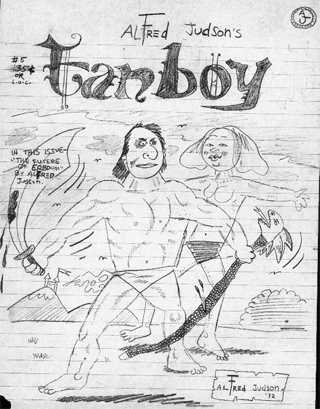 Image may be NSFW.
Image may be NSFW.
Clik here to view.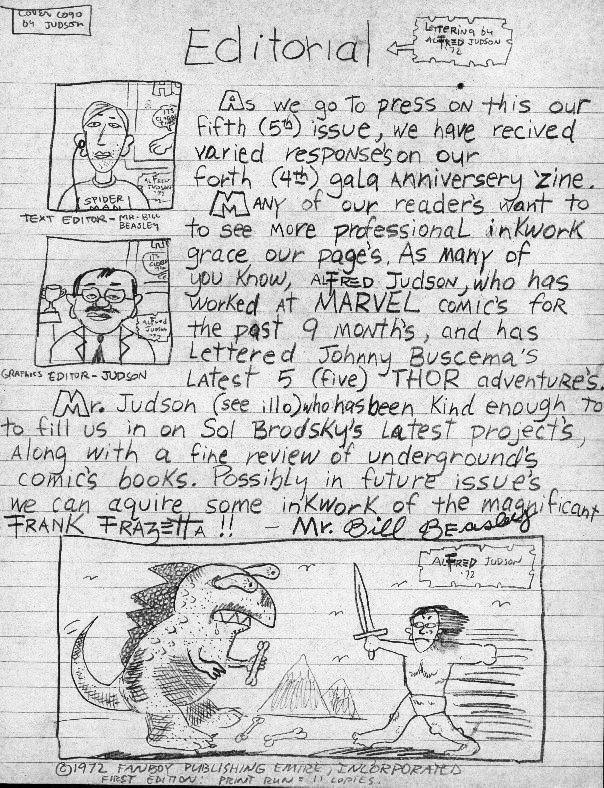
Lynch explained that the term came from the slang term “funboy,” which was used in the 1960s by Bill Killeen as an insult for critics of his Tallahassee-based publication The Charlatan, known for its provocative content.[6]“Fanboy” was intended to satirize the way traditional comic fans disregarded underground comics considered as “vulgar modernism,” as exhibited in the untraditional art styles found in humor magazine Mad and Zap Comix.[7]
Spread
A year after Lynch’s zine came out, cartoonist R. Crumb used the term in the third strip of his Village Voice comic Mr. Natural[8] (shown below) published in 1976.
Image may be NSFW.
Clik here to view.
Within the comics fandom, many used the term satirically as a way to distinguish one type of fan from another. Often, it was the fanboys themselves using the term to mock their own actions within the community. However, by May 1996, the term had been used in a pejorative manner within the tech community on Usenet. One of the earliest instances appeared in a newsgroup discussion about Windows NT[9] in response to a user defending Bill Gates and Microsoft.
Actually, Edward, I was portraying the Dear Leader, Chairman Gates, as a totalitarian dictator in the mold of Josef Stalin or Mao Zedong. Clearly, as a besotted Bill Gates fanboy, you disagree. Fine – if you like using mediocre software that behaves like it was programmed by a bunch of drunk monkeys, more power to you.
In 1997, Fanboy.com[18] was launched by Michael Pinto[19] as a film and book review blog in 2006. “Fanboy” was first defined on Urban Dictionary in its perjorative sense in June 2003[13] (shown below), associating the term with people who are incredibly attached to SEGA. A second definition was added on August 22nd, 2003, noting that fanboys tend to “let passion override social graces.” This definition was chosen as the Urban Word of the Day on September 19th, 2006.
Image may be NSFW.
Clik here to view.
“Fanboy” was added to the Merriam-Webster dictionary[12] in 2008, which traces the first known use of “fan boys” back to 1919[21] in a passage describing young male baseball fans. However, this may not have had an effect on the term as we know it, and the Oxford English Dictionary does not mention any reference in print prior to 1985.[1] Fanboys[15] and fangirls[16] are frequently discussed topics on Tumblr, often used in the empathetic sense by those who consider themselves as diehard fans themselves. As of January 2012, there are more than 5600 uses of “Fanboy” on Reddit.[22] There is also a TV Tropes[20] page for the term, providing a number of pop culture examples of fanboys and fangirls.
Notable Fandoms
Online, fanboys and fangirls often leverage their love of something into arguments with those who either do not enjoy the object of their fandom or are part of a rival fandom. Notable fandoms known for having argumentative fanboys and fangirls include, but are not limited to, Justin Bieber[24], Apple Inc.[25], Bronies, Korean pop music[28], XBOX 360 and Playstation 3[29], as well as video game franchises including video games like The Legend of Zelda series[23], Sonic the Hedgehog[26] and Minecraft.[27]
Image may be NSFW.
Clik here to view.
As of 2008, click through to see entire Technologizer graph.
In Popular Culture
1995: Freakazoid
The 1990s Cartoon Network series Freakazoid! briefly highlighted fan boys through a character named Fanboy who aspires to become the superhero’s sidekick in a September 1995 episode.[10] The character is depicted as a nerdy, overweight teenager who later chases George Takei out of a comic book shop due to his overwhelming excitement.
1999: Fanboy Comic
DC Comics launched a six issue miniseries titled Fanboy[11] by Mark Evanier and Sergio Aragonés in 1999 about a teenage comic book store employee and aspiring comic artist named Finster. Throughout the series, he spent much time daydreaming about the adventures he would have a superhero, which were interpreted by dozens of well-known comic illustrators.
Image may be NSFW.
Clik here to view.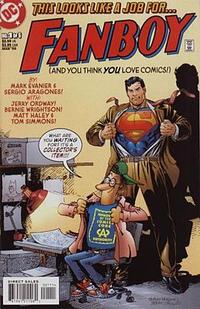 Image may be NSFW.
Image may be NSFW.
Clik here to view.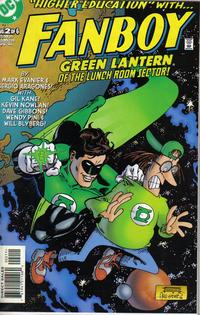 Image may be NSFW.
Image may be NSFW.
Clik here to view.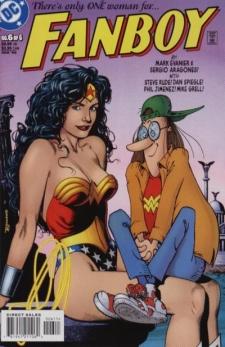
2009: Fanboys Film
In February 2009, the comedy film Fanboys_[17] was released, chronicling a group of friends and _Star Wars fans who set out to invade George Lucas’ Skywalker Ranch in search of securing a copy of Star Wars Episode I: The Phantom Menace for their friend suffering from cancer. The film features a number of cameos from Star Wars actors including Carrie Fisher (Princess Leia), Ray Park (Darth Maul) and Billy Dee Williams (Lando Calrissian).
2009: Fanboy and Chum Chum
The Frederator Studios animated series Fanboy and Chum Chum premiered on Nickelodeon on November 6th, 2009. The channel’s first original computer-animated Nicktoon, the show features two science-fiction and fantasy fans who dress like superheroes with masks and capes and go on a series of adventures.
Search Interest
External References
[2]Potrzebie – Origin of word “fanboy”
[3]Lambiek Comiclopedia – Jay Lynch
[4]LA Weekly – Glenn Bray: Visionary Quester
[5]Comics Price Guide – Beasley & Judson’s FANBOY Magazine
[6]Gainesville Sun – Alternative Press
[7]Confessions of an Aca-Fan – “I Like to Sock Myself in the Face”: Reconsidering “Vulgar Modernism” (Part One)
[8]Heritage Auctions – Robert Crumb Mr. Natural Weekly Comic Strip #3 Original Art (Village Voice, 1976)
[9]Google Groups Archive – Larry Doering’s Post
[10]IMDb – And Fan Boy Is His Name/Lawn Gnomes Chapter IV: Fun in the Sun/Freak’s French Lesson
[11]WIkipedia – Fanboy (comics)
[12]Joystiq – ‘Fanboy’ gains respect, enters Merriam-Webster dictionary
[13]Urban Dictionary – Fanboy | June 26th, 2003
[14]Urban Dictionary – Fanboy | August 22nd, 2003
[15]Tumblr – Posts tagged “fanboy”
[16]Tumblr – Posts tagged “fangirl”
[17]Wikipedia – Fanboys (film)
[19]Michael Pinto – Exclusive Interview: Michael Pinto of Fanboy.com
[22]Reddit – Search results for “fanboy”
[23]The Game Effect – Top 5 Recent Fanboy Arguments
[24]Lovelyish – 11 of the Craziest Justin Bieber Fangirl Tweets Ever
[25]Business Insider – The Most Delusional Apple Fanboy Spin We’ve Seen About The Maps Debacle
[26]Urban Dictionary – Sonic fanboys
[27]Urban Dictionary – Minecraft fanboy
[28]Seoul Beats – The 101 on Crazy K-pop Fangirls